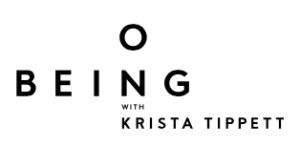On Saturday I asked the question, how can we bring a theology of “enough” into public discourse?
Not surprisingly I subsequently went for a run while listening to On Being and heard a conversation that pretty much answers my question. Well, it provides one answer to my question.  Or, at least, it describes something that is happen
Or, at least, it describes something that is happen
ing that should give me hope that we as a people are answering the question of how or why we should take care of one another and the planet in less selfish ways.
The conversation was one Krista Tippett had entitled, “Capitalism and Moral Evolution: A Civil Provocation,” with Jonathan Haidt and Melvin Konner.
There were a couple of moments in the interview that stood out to me.
The Moral Circle
One was the observation that our moral circle is expanding. That is, as humans we are collectively broadening those whom we see as worthy of equal treatment.
This observation resonated with me: I like to say that the history of America is the story of the evolution of the significance of the word “men” in the phrase, “We hold these truths to be self evident: that all men are created equal…”
It’s not just all white land-owning males.
This positive dynamic in our life together raises the mirror for us, asking where our tribalism is keeping us from imagining others as equal human beings with equal rights to ourselves. Tribes of any stripe can be maniacal and violent in the suppression of other tribes. At Duke we used to talk about the great acts of verbal violence that would ensue upon voicing any critique of John Howard Yoder and his pacifism.
Tribalism was an evolutionarily blessed instinct but now it could kill us. Wittingly or no, we are reaching toward a better future by widening our understanding of who the people are who deserve to be treated with moral respect.
The guests discussed this as the evolution of the collective human conscience. I like that idea. Both guests also agreed that the arc of human history is bending toward justice, though they disagreed at how proactive we need to be to facilitate or ensure that bending.
Capitalistic Liberalism
The other dynamic that struck and intrigued me was the discussion of how progressive politics grows out of capitalism. Specifically, there will be a generation that works hard to get ahead, using and exploiting whatever resources are at there disposal. And then their children will demand that the work be done with greater ethical awareness: better for the planet, better for the labor.
I am always fascinated by the arguments that advocates of business and capitalism make for the ways that the system transforms the world for the better for those who did not have the power to transform it themselves. For instance, one person in this interview voiced the claim that the poorest people in America are 40% better off than they were 30 years ago.
Maybe.
They were also quite sober about the reality that it is those farthest down the supply chain that bear the brunt of the injustice created by capitalist commerce.
On the other hand, we have also seen that those not so far down the food chain can be victims of tremendous loss when under-regulated “free market” banking practices prey on the gullibilities of the system.
Enlightened Self-Interest
Somehow these two things need to come together. While I continue to live and move and have my being within a world in which the approximation of God-likeness is a driving and motivating factor this generally makes for political arguments that I don’t find satisfying. One of my core convictions is that I should not advocate for public policy that I hold only on the basis of my religious persuasion. We have freedom of religious expression in America and I think that’s a good thing.
To make an argument in the public sphere demands a more difficult argument: that what we offer is good for the city, state, nation, or world as a whole and that is, on aggregate, good for the persons contained in each.
Maybe the best argument I made in combating an anti-legalization position regarding undocumented workers was that once they are documented they will get social security numbers and begin to pay into the systems that they might have to use—and are already using—for medical care. Or maybe they’ll have insurance so that they won’t have to use Medicaid. Or maybe they’ll be able to / have to buy into Obamacare so that they don’t unduly burden the system. Financial win.
Sometimes the idea that “they are us” does not, in itself, win. That is far too often the backward-looking conclusion that we have been drawn to by other means.
So it might be that our best way forward is to pursue good, solid arguments of enlightened self interest. To show that yes, there is enough for all: enough work, enough food, enough medical care, and that there will be a greater abundance of all these things if we widen the circle of those working to make it so.












